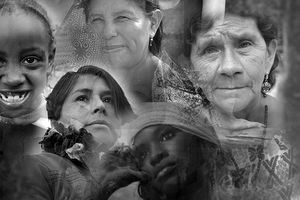 CIAT, Mark Koester, Momentcaptured1, Neil Palmer / Flickr
CIAT, Mark Koester, Momentcaptured1, Neil Palmer / Flickr
The Kroc Institute recently released a report in collaboration with UN Women, Women’s International Democratic Federation, and Sweden, describing how the inclusion of a gender perspective and specific gender-related commitments in the text of the 2016 Colombian Peace Accord is an important step toward strengthening women's meaningful participation in the building of peace. This issue of Peace Policy distills some of the key lessons from this report and other experts on how the active participation of women, including black, indigenous, and rural women, offers the opportunity for the peace agreement to be a means of achieving gender equality, thereby addressing structural inequalities and working toward a sustainable peace in Colombia.
New posts in the December 2018 issue of Peace Policy:
Rebecca Gindele and Carolina Serrano review the gender focus written into the Colombian Accord and the mechanisms that are being put in place to ensure these commitments are implemented. More »
Louise Olsson and Madhav Joshi describe the methodology and quantitative findings regarding implementation of gender commitments in the Colombian Accord. More »
Kate Paarlberg-Kvam discusses the use of UN Security Council Resolution 1325 as a tool for Colombian women to amplify their voice in the peace process. More »
About Peace Policy
Peace Policy offers research-based insights, commentary, and solutions to the global challenge of violent conflict. Each issue features the writing of scholars and practitioners who investigate the causes of violent conflict and who seek to contribute to effective solutions and alternatives to the use of force.
Peace Policy is edited by David Cortright, director of policy studies at the Kroc Institute, dcortrig@nd.edu.
Visit the latest issue of Peace Policy at peacepolicy.nd.edu